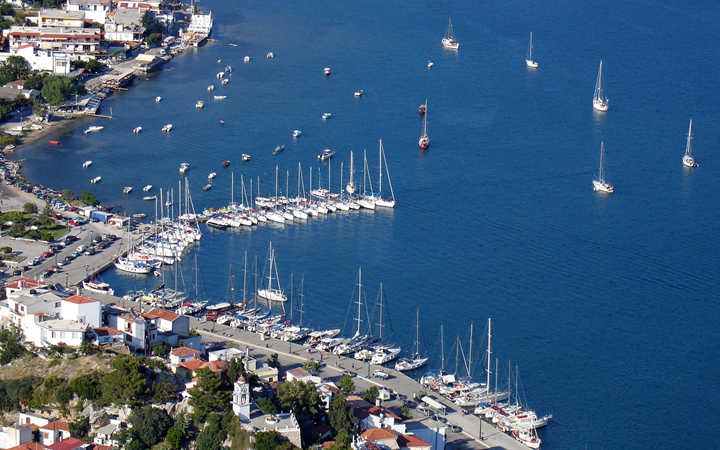The Sporades
The Sporades (“scattered”) are found off the central east coast of Greece. There are 24 of them scattered about this region, but only 4 of them support year-round residents. These are Skiathos, Skopelos, Alonissos, and Skyros. The Sporades are relatively green because of prevailing weather patterns which dump a lot of water on them during the winter. The turquoise water off these islands is world-famous. All of these islands are reachable from Volos by ferry, or, in the case of Skiathos, by air. Ferries also leave from Agios Konstantinos, further south on Greece’s National Road from Volos.
Just to the south of this grouping, nearby Evia is Greece’s second-largest island after Crete, and a favorite destination for Greeks from Athens.
Skiathos has an international airport, and thus attracts the most tourists. It’s home to a lot of foreigners living year-round. The night life there is livelier, and the tourist infrastructure is more highly developed. Still it’s a quiet island compared to places like Mykonos, and offers excellent beaches and swimming. Kastro is the old fortified capital and has interesting ruins. Southern Skopelos has especially nice beaches.
Skopelos Town, capital of the island of Skopelos, is the prettiest harbor town of the Sporades. Locals like to say it’s the greenest Aegean island, and if it isn’t, it’s pretty close. The film Mama Mia was made here. It’s a forgettable movie with unforgettable photography thanks to the use of Skopelos as the plot’s backdrop. The church of Agios Ioannis, used for the wedding in Mama Mia, is a cozy chapel located spectacularly on top of a large rock outcrop jutting out above and over the sea. Skopelos is nicely forested. The monk seal makes his home in some of the more secluded inlets of the island.
Alonissos features nice pine forests. It’s a less-visited island than the others, and thus great to get away from the crowds. There is a daily excursion boat from the port of Patitiri for sight-seeing and swimming at the Marine Park of the Northern Aegean, dedicated in 1992 and at over 2,200 square km is the biggest marine preserve in Europe. It includes all of the smaller islets off the southeast coast of Alonissos. Wildlife includes the Monk seal, eagles, wild goats, dolphins and pilot whales. Alonissos has great hiking trails. There is a mule path to the village of Liadromia, whose citizens moved after a 1965 earthquake. Greeks sold many of the houses to foreigners and now live closer to the sea. Views from the high elevation of the village are spectacular, with glimpses of the 100-kilometer distant peak of Mt. Athos possible under ideal conditions.
Skyros is another island made green by frequent winter rain and abundant pine forests. Although included in the Sporades group, it’s different: it’s larger, and more set apart, at about 50 km southeast of the other 4 Sporades. It’s also the least-visited because of its location. You can get to Skyros by boat either from Volos, or, more quickly, from Kimi in Evia. Local men used to wear baggy trousers and round flat caps. Some still do, but this style of dress has mostly disappeared.
Skyros is famous for its wild, Dionysian carnival, held the week before Lent every spring. The centerpiece of the Skyrian carnival is the goat dance, where the goat skin-wearing “geroi (strong ones”) dress in goat skins worn shaggy side out and hung with livestock bells and lead groups of dancers. They threaten revelers from behind their kid-skin masks with cutout eye holes by shaking their shepherd’s crooks. They are accompanied by their consorts, men dressed in drag and called ‘korelles (maidens).”Some believe this bizarre ritual is a survival of ancient fertility rites dating back to the pre-Christian era, held to insure a good growing season.
As a final note on Skyros, the English poet Rupert Brooke is buried in this remote corner of the Aegean. He was on a French hospital ship transporting casualties of Gallipoli to Western Europe in 1915. His grave is in a lonely olive grove. Engraved on his headstone are his most famous lines, used to motivate men to enlist in WWI: “If I should die, think only this of me: That there’s some corner of a foreign field that is forever England.” Skyrians have great respect for Brooke, second among English poets only to Lord Byron, who died 80 years earlier helping Greece revolt against Turkish rule.












